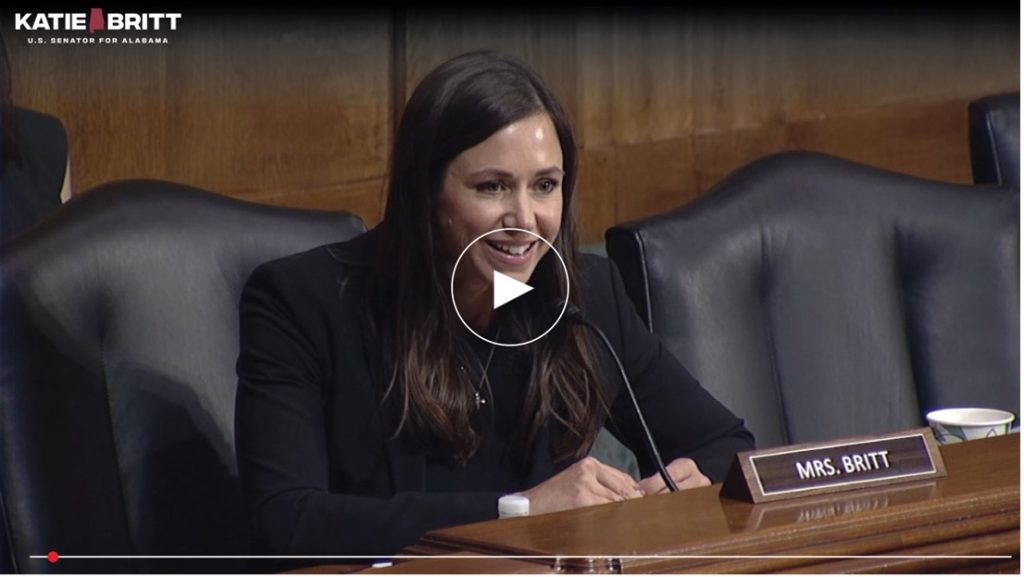U.S. Senator Katie Britt Challenges Current Pharmacy Benefit Structure, Fights for Local Independent Pharmacies
‘Why do most employers accept a model where intermediaries are incentivized by the size of the rebate, rather than the value of the drug to the patient?’
WASHINGTON, D.C. – U.S. Senator Katie Britt (R-Ala.) attended a Senate Judiciary Committee hearing entitled “PBM Power Play: Examining Competition Issues in the Prescription Drug Supply Chain” to examine the role of pharmacy benefit managers (PBMs). She heard from a number of witnesses, including Dr. Randy McDonough, cofounder and owner of Towncrest Pharmacy; Dr. Neeraj Sood, a professor at the University of Southern California’s Price School of Public Policy; and Dr. Sheetal Kircher, an associate professor at Northwestern University’s Feinberg School of Medicine.
Senator Britt began her opening statement by lamenting closures of independent pharmacies, stating, “. . . in Alabama, we looked at the reliable data between [2018 and 2025] – we had over 225 closed doors . . . a rate of about one per month. When you’re dealing with a state like Alabama, when in our rural communities, local independent pharmacies [are] often the only health care provider within 20 or 30 miles, this is absolutely, completely unacceptable.”

“When PBMs impose retroactive clawbacks, DIR fees, and below-cost reimbursement rates, they’re not just squeezing your bottom line, they are pushing out entire communities towards pharmacy deserts,” the Senator continued. “Are current PBM practices accelerating the loss of rural pharmacies? And what does that mean for basic access to medications and clinical services in places like rural Alabama?” she asked.
Dr. McDonough responded affirmatively that PBM practices are accelerating the closures of rural pharmacies, saying, “I’ve also seen how community pharmacies, when they close up, how the community misses them because they may be the only health care provider, as you said, that they have access to. And these are not just community pharmacies. These are people who are trusted within the community, who contribute back to the community. These are the people who get the calls after hours. And actually, if you take a drug to a patient at their home, that’s what’s missing. And we’re going to be losing more and more.”
Senator Britt agreed, saying, “There is a relationship aspect in our rural communities that cannot be matched. When you’re looking at creating opportunity, that opportunity for the American Dream, you can’t draw in that opportunity without access to care, without access to pharmacies. No one is going to come and locate a plant and create good paying jobs, or decide to expand in a place that has a pharmacy desert . . . looking at this in a place like Alabama, where 55 out of 67 of our communities are rural communities, they deserve better.”
She continued her line of questioning: “As the PBM debate rolls on, I’m struck by how the patient and employers, the ones who are actually paying the bills, seem to be the least empowered voices in the entire system. Employer-sponsored health care insurance remains the primary source of health coverage in America, so more than 164 million Americans obtain coverage through an employer . . . Why do most employers accept a model where intermediaries are incentivized by the size of the rebate, rather than the value of the drug to the patient?”
Dr. Sood responded to Senator Britt’s question, saying, “I think the challenge is employers don’t have a lot of choice. 80% of the market is controlled by the big three PBMs . . . that scale is important in leveraging, our discount from manufacturers, but I think employers would prefer a model where there was a direct price reduction and no rebates, because then I can make sure that I’ve got the money . . . ”
“. . . what else do you think is needed for more visibility, bargaining power, and value for our dollar?” Senator Britt followed up.
“What is needed is greater transparency so that we know, or employers can know, whether they’re getting a good deal or not. And we need a fiduciary responsibility for PBMs that if they don’t act in the best interest of plan members or employees, we can address that in the courts,” Dr. Sood responded.
In her final line of questioning, the Senator asked Dr. Kircher if she believed that “rebate-driven formula design and utilization tools reflect sound clinical judgment?”
“Oftentimes, no. Oftentimes, we are trying to fight for medications that are nationally guideline accepted that we are still fighting for,” Dr. Kircher responded.
The Senator’s full line of questioning can be viewed here.
###